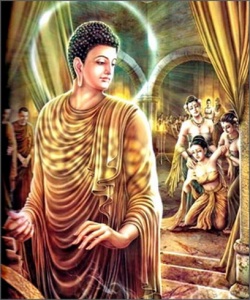Difference between revisions of "Four sufferings"
(Created page with "thumb|250px| <poem> four sufferings [四苦] (Jpn shi-ku ) The four universal sufferings: birth, aging, sickness, and death. Various sutras describ...") |
|||
| (4 intermediate revisions by 2 users not shown) | |||
| Line 1: | Line 1: | ||
[[File:Z p11-Im.jpg|thumb|250px|]] | [[File:Z p11-Im.jpg|thumb|250px|]] | ||
<poem> | <poem> | ||
| − | four sufferings | + | [[four sufferings]] |
| − | [四苦] (Jpn shi-ku ) | + | [[四苦]] (Jpn [[shi-ku]] ) |
| − | The four universal sufferings: birth, aging, sickness, and death. Various sutras describe Shakyamuni's quest for enlightenment as motivated by a desire to find a solution to these four sufferings. Shakyamuni awakened to these sufferings through four encounters known as the "four meetings" that took place around the grounds of his father's palace when he was a young prince. This awakening is what motivated him to renounce secular life and pursue the religious path in order to attain enlightenment. Later four more sufferings came to be added to these four sufferings, yielding the concept of "eight sufferings." The four additions are the sufferings of having to part with loved ones, of having to meet those one hates, of being unable to obtain one's desires, and suffering arising from the five components of life. The "four sufferings" and the "eight sufferings" often indicate all human suffering. See also eight sufferings; four meetings. | + | The four [[universal]] [[sufferings]]: [[birth]], [[aging]], [[sickness]], and [[death]]. Various [[sutras]] describe [[Shakyamuni's]] quest for [[enlightenment]] as motivated by a [[desire]] to find a solution to these four [[sufferings]]. [[Shakyamuni]] [[awakened]] to these [[sufferings]] through four encounters known as the "[[four meetings]]" that took place around the grounds of his father's palace when he was a young {{Wiki|prince}}. This [[awakening]] is what motivated him to {{Wiki|renounce}} {{Wiki|secular}} [[life]] and pursue the [[religious]] [[path]] in [[order]] to attain [[enlightenment]]. Later four more [[sufferings]] came to be added to these [[four sufferings]], yielding the {{Wiki|concept}} of "[[eight sufferings]]." The four additions are the [[sufferings]] of having to part with loved ones, of having to meet those one hates, of [[being]] unable to obtain one's [[desires]], and [[suffering]] [[arising]] from the [[five components]] of [[life]]. The "[[four sufferings]]" and the "[[eight sufferings]]" often indicate all [[human]] [[suffering]]. |
| + | |||
| + | See also [[eight sufferings]]; [[four meetings]]. | ||
</poem> | </poem> | ||
{{R}} | {{R}} | ||
[http://www.sgilibrary.org/search_dict.php?SearchSelect=dict&p=5&m=1&in=2&q=Enlightenment www.sgilibrary.org] | [http://www.sgilibrary.org/search_dict.php?SearchSelect=dict&p=5&m=1&in=2&q=Enlightenment www.sgilibrary.org] | ||
[[Category:Buddhist Terms]] | [[Category:Buddhist Terms]] | ||
| − | [[Category:Suffering]] | + | [[Category:Suffering]]{{BuddhismbyNumber}} |
Latest revision as of 04:30, 10 October 2014
four sufferings
四苦 (Jpn shi-ku )
The four universal sufferings: birth, aging, sickness, and death. Various sutras describe Shakyamuni's quest for enlightenment as motivated by a desire to find a solution to these four sufferings. Shakyamuni awakened to these sufferings through four encounters known as the "four meetings" that took place around the grounds of his father's palace when he was a young prince. This awakening is what motivated him to renounce secular life and pursue the religious path in order to attain enlightenment. Later four more sufferings came to be added to these four sufferings, yielding the concept of "eight sufferings." The four additions are the sufferings of having to part with loved ones, of having to meet those one hates, of being unable to obtain one's desires, and suffering arising from the five components of life. The "four sufferings" and the "eight sufferings" often indicate all human suffering.
See also eight sufferings; four meetings.
